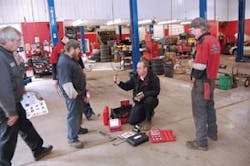Just as a technician needs the right tools for the job, distributors need the right tools for their job. The ability to demonstrate value to a customer is a key element of relationship-building with your customers, and demo programs are a powerful way to communicate the benefits of premium tools and equipment.
The slump
The economic slump in 2009 hit everyone across the board. On the OEM side, more than 2,000 dealerships have closed their doors in the last two years. Some of the technicians left in the cold were fortunate enough to find new jobs, others didn’t fare so well. The bottom line is that there were fewer technicians in the market, who were more careful with their spending. Many technicians held onto their tools longer, and only replaced them out of necessity—often with lower-priced, entry-level tools. Many distributors kept inventories at a minimum to weather the storm. For technicians with less money in their pockets, price—not value—became a much bigger factor in a purchase.
Now the worst seems to be over, as several factors indicate an increase in automotive work. With more money in technicians’ pockets, tool purchases are beginning to recover.
The price
When it comes to investing in a new tool, technicians rely on several means to make buying decisions. Technicians look at overall quality and value, brand reputation, price, features and benefits such as power-to-weight ratios, warranties; the list goes on. Out of all these factors, price is often considered first. Whether it is because they don’t think they need any fancy features, or simply can’t afford to consider a premium tool, price is the only factor that can be immediately experienced without actually using the equipment. A customer can read in a brochure about the weight of an angle grinder, or the best-in-class torque of an air ratchet, but they can’t really experience how these features would affect their productivity on a daily basis without actually using the tool. Someone can look at a number on the back of a sell sheet and know exactly what it will feel like to write a check for that amount. This price-point trepidation can make it difficult for distributors to communicate the long-term benefits of premium tools, but if successfully overcome, can lead to increased sales.
The demo
Demo programs are a great way for distributors to offer their customers a chance to try out a specific tool that they may otherwise never get the chance to. Allowing your customers to try new tools and equipment in their own work environment is a great way to establish rapport, and an even better strategy to sell a tool. A simple demonstration can go a long way on its own, but leaving a tool behind for a week allows a technician to genuinely experience its features and benefits on his own terms, and can have a powerful influence on a buying decision.
Many technicians don’t realize how beneficial the features of a premium tool can be, simply because they’ve never had the chance to try one. If what they have works for them, what reason would they have to upgrade? This has always been a challenge for distributors, and for those working with customers locked in to entry-level tools, demo programs are a powerful way to upsell.
Demo programs can also be used as a strategy for stimulating demand. A tech may not be aware of how beneficial a certain feature of a new tool might be, but if he tries it, or a co-worker tries it, it can stimulate an internal discussion and may result in a few sales. As a risk-free opportunity for techs to try a new tool, it’s hard to say no.
Demo programs are also able to help distributors overcome inaccurate perceptions of new tools and equipment. As an example, there have recently been several quiet air tools introduced into the marketplace. Some technicians are under the impression that these tools are not as powerful as standard tools, as there is an attitude with some mechanics that noise equals power. But quiet tools are often every bit as powerful as standard tools—they have just been engineered to run more quietly, which can dramatically reduce noise in the garage. While a new generation of technicians is catching on to this, there are still many that remain skeptical. When dealing with these customers, a demo program would allow distributors to communicate these benefits to their customers more effectively, and would go a long way toward overcoming the perception gap.
Whether they help to overcome certain perceptions about new products, more effectively communicate the features and benefits of premium tools and equipment, or build stronger, trusting relationships with your customers, demo programs are an essential tool for distributors. As business picks up, demo programs will prove to be an effective way to drive demand and generate sales.
This report furnished by Ingersoll Rand.


